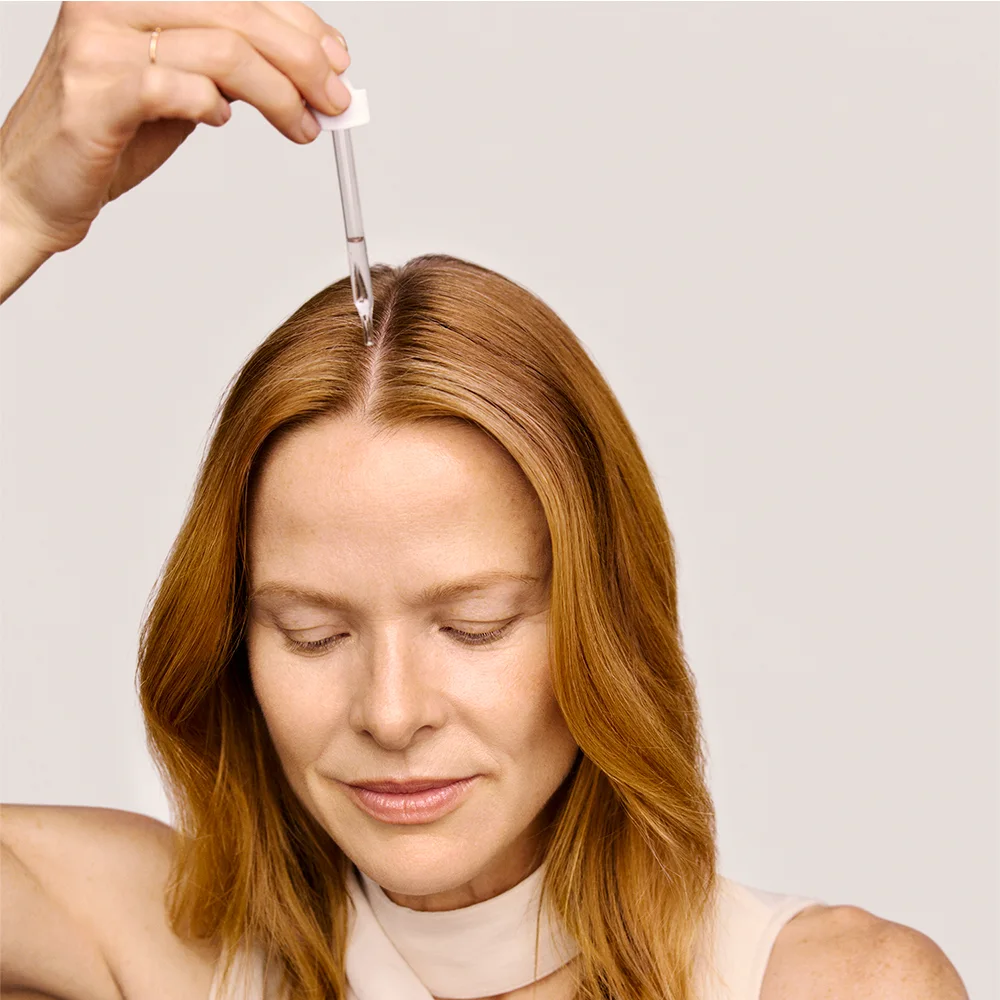Here's what we'll cover
Here's what we'll cover
It can feel unnerving if you start to notice thinning hair, and you may wonder what could be causing it. In some cases, hair loss can be caused by an underlying condition, like a thyroid disorder. Keep reading to learn all about thyroid-related hair loss and how to treat it.
Can the thyroid cause hair loss?
The small, butterfly-shaped thyroid gland in our necks usually goes unnoticed until it causes problems. And whether the thyroid is producing too much or too little of the hormones that are important to so many different functions in our body, problems with thyroid function can affect hair growth, texture, pigmentation, and can even cause hair loss.
The thyroid gland makes hormones called T3 and T4, which, among other things, regulate the body’s metabolism.
Having too much of these hormones (a condition called hyperthyroidism) or too little of these hormones (hypothyroidism) can directly impact the hair growth cycle, potentially leading to hair loss (van Beek, 2008).
Unlike the most common cause of hair loss, androgenic alopecia (better known as male or female pattern baldness), thyroid-related hair loss typically results in overall thinning of the hair (also known as diffuse hair loss), rather than a bald spot at the crown, a receding hairline, or isolated patches with no hair at all.
Other symptoms of thyroid disorders
Hair loss is more likely to develop when a thyroid condition has gone untreated, but it’s not the only symptom of thyroid disorders.
If you have hypothyroidism (underactive thyroid), you may experience any of the following symptoms (Wilson, 2021):
Sensitivity to cold or cold intolerance
Fatigue
Weight gain
Dry skin
Constipation
Voice changes
Hyperthyroidism (overactive thyroid) may come with the following symptoms (De Leo, 2016):
Heart palpitations (being aware of your heartbeat)
Fatigue
Tremor
Anxiety
Trouble sleeping or sleep disturbances
Weight loss
Heat intolerance
Sweating
Excessive thirst
Other causes of hair loss
Hair loss can develop for several reasons besides your thyroid health. Other possible causes of hair loss include:
Genetics: A family history of male pattern baldness and female pattern baldness can increase your risk for hair loss.
Alopecia areata: This is an autoimmune condition that causes hair loss.
Hormonal changes: Pregnancy, endocrine disorders like polycystic ovarian syndrome (PCOS), or other hormonal changes can result in hair loss.
Nutrient deficiencies: Poor nutrition can lead to hair loss, including not getting enough fatty acids, iron, zinc, protein, or B-vitamins.
Anemia: This is a condition where you don’t have enough red blood cells to deliver adequate oxygen to the cells.
Scalp damage: Trauma to the scalp and hair follicles, like burns or scarring, can lead to hair loss and prevent that area from being able to regrow hair.
How to treat thyroid conditions
In most cases, thyroid-related hair loss may be treatable. Treatment depends on the thyroid condition you have.
Hypothyroidism treatment
The standard treatment for an underactive thyroid is thyroid medication to replace these hormones. Synthetic thyroid hormones help replace the hormones your body isn’t producing, reversing the symptoms of hypothyroidism (Wilson, 2021).
The most common treatment for hypothyroidism is levothyroxine (brand names include Synthroid, Levothroid, and Unithroid), a synthetic form of T4 (Shakir, 2021). Rarely and only under certain circumstances, a healthcare provider may recommend treatment with T3 instead, which is known as liothyronine (brand names include Cytomel and Triostat). While desiccated thyroid (brand names include Armour Thyroid and Westhroid), which is derived from animals, was once commonly used, it’s not prescribed as often today.
Treatment for overactive thyroid depends on the cause but may include (De Leo, 2016):
Antithyroid drugs: These types of thyroid medications help reduce thyroid hormone levels in your body. Examples include methimazole and propylthiouracil.
Ablation: This procedure uses radioactive iodine to destroy part or all of your thyroid gland to help reduce thyroid hormone levels.
Surgery: A thyroidectomy, a procedure to remove part or all of the thyroid gland, may be recommended.
Treatments for hair loss
If you have thyroid-related hair loss, you’ll likely see hair regrowth after treating the underlying thyroid disease. In some cases, though, your hair loss could also be from one of the other causes of hair loss.
Here are some common ways to treat hair loss from other causes:
Minoxidil (Rogaine) is a topical solution applied directly to the scalp, which may help stimulate hair growth.
Finasteride (Propecia) is an oral prescription medication to treat male pattern baldness.
Nutrition supplements—If your hair loss is caused by a nutrient deficiency, like a lack of biotin, taking a supplement may resolve the hair loss. Speak with your healthcare provider about getting tested before starting a supplement regimen since only a small subset of people don’t get enough of their daily vitamins from the food they eat.
Speak to a provider
Losing your hair can be a stressful experience. Fortunately, if a thyroid problem causes your hair loss, the symptoms can likely be reversed. Your healthcare provider can help you create a treatment plan.
DISCLAIMER
If you have any medical questions or concerns, please talk to your healthcare provider. The articles on Health Guide are underpinned by peer-reviewed research and information drawn from medical societies and governmental agencies. However, they are not a substitute for professional medical advice, diagnosis, or treatment.
Oral Minoxidil Important Safety Information: Read more about serious warnings and safety info.
Finasteride Important Safety Information: Read more about serious warnings and safety info.
De Leo, S., Lee, S. Y., & Braverman, L. E. (2016). Hyperthyroidism. Lancet , 388 (10047), 906–918. doi:10.1016/S0140-6736(16)00278-6. Retrieved from https://www.ncbi.nlm.nih.gov/pmc/articles/PMC5014602/
Shakir, M., Brooks, D. I., McAninch, E. A.,et al. (2021). Comparative effectiveness of levothyroxine, desiccated thyroid extract, and levothyroxine+liothyronine in hypothyroidism. The Journal of Clinical Endocrinology and Metabolism , 106 (11), e4400–e4413. doi:10.1210/clinem/dgab478. Retrieved from https://pubmed.ncbi.nlm.nih.gov/34185829/
van Beek, N., Bodó, E., Kromminga, A., et al. (2008). Thyroid hormones directly alter human hair follicle functions: anagen prolongation and stimulation of both hair matrix keratinocyte proliferation and hair pigmentation. The Journal of Clinical Endocrinology and Metabolism , 93 (11), 4381–4388. doi:10.1210/jc.2008-0283. Retrieved from https://pubmed.ncbi.nlm.nih.gov/18728176/
Wilson, S. A., Stem, L. A., & Bruehlman, R. D. (2021). Hypothyroidism: diagnosis and treatment. American Family Physician , 103 (10), 605–613. Retrieved from https://pubmed.ncbi.nlm.nih.gov/33983002/










